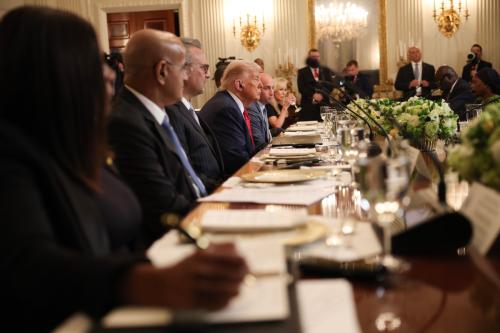Britain is America’s closest ally, so eyebrows were raised yesterday when news broke that it would join the Chinese-led Asian Infrastructure Investment Bank (AIIB). An anonymous White House official rebuked Britain for “constant accommodation” of China. The AIIB is one of several Chinese initiatives (including the BRICS Bank and the New Silk Road) to create new international financial institutions that stand alongside, and maybe compete with, traditional organizations like the World Bank, the International Monetary Fund, and the Asian Development Bank.
The Obama administration has been widely criticized for its response to China’s initiative. After years of calling on China to take more responsibility in global affairs, the United States is now perceived as opposing the AIIB tooth and nail. The administration has responded that they do not oppose its creation per se, but have serious concerns that it will not meet governance standards of other institutions, especially on anti-corruption and environmental grounds. However, many of America’s allies and partners have claimed that U.S. diplomacy has followed a very different track by lobbying hard against membership regardless of what assurances are given.
The U.S. approach to the AIIB has been confused and contradictory. There is also little doubt that the public rebuke by the White House of the U.K. was ill-advised. It resurrects the perception that the United States is opposed to the AIIB on principle, and not just if it is designed badly. It also suggests that all concerns about the AIIB are driven by the United States, when in fact many Asian democracies also worry about the governance standards. So, in the coming days, the Obama administration will take some criticism, much of it merited, for its approach. Hopefully, it will result in more coherent and effective economic diplomacy.
But Britain should not be let of the hook. It is extraordinary that the U.K. would join the AIIB without pre-conditions at a time when Australia and South Korea are engaged in delicate diplomacy with Beijing on their engagement with the bank. It puts Asian democracies on the back foot and helps Beijing in these negotiations. It sends a message that China can set the rules unilaterally and Britain will follow.
It appears as if David Cameron’s government took this decision because it wanted to be the first to join and to get the credit from China for doing so. Unfortunately, this would be entirely consistent with the government’s track record toward China, which has been solely based on commercial interest rather than a strategic assessment of how to promote a stable and peaceful regional order in East Asia.
The idea that Britain believes it can better influence the governance of the AIIB from the inside seems unlikely—does anyone serious believe this U.K. government, with its focus on commercial opportunity, would walk away from the AIIB if it was dissatisfied? In any event, it would have been better for democracies to bargain collectively with Beijing. One would hope that Asian democracies are privately expressing their concern to the U.K. government today.
Looking forward, the United States needs to move beyond obstructionism and figure out a better strategy for dealing with China’s competitive economic diplomacy. This includes working constructively to shape institutions of Chinese origin and figuring out which institutions really endanger a stable regional order in East Asia. It should also be a wake-up call for Congress to support the Trans-Pacific Partnership and a pro-active economic strategy in the Pacific.
The Brookings Institution is committed to quality, independence, and impact.
We are supported by a diverse array of funders. In line with our values and policies, each Brookings publication represents the sole views of its author(s).




Commentary
A special argument: The U.S., U.K., and the AIIB
March 13, 2015